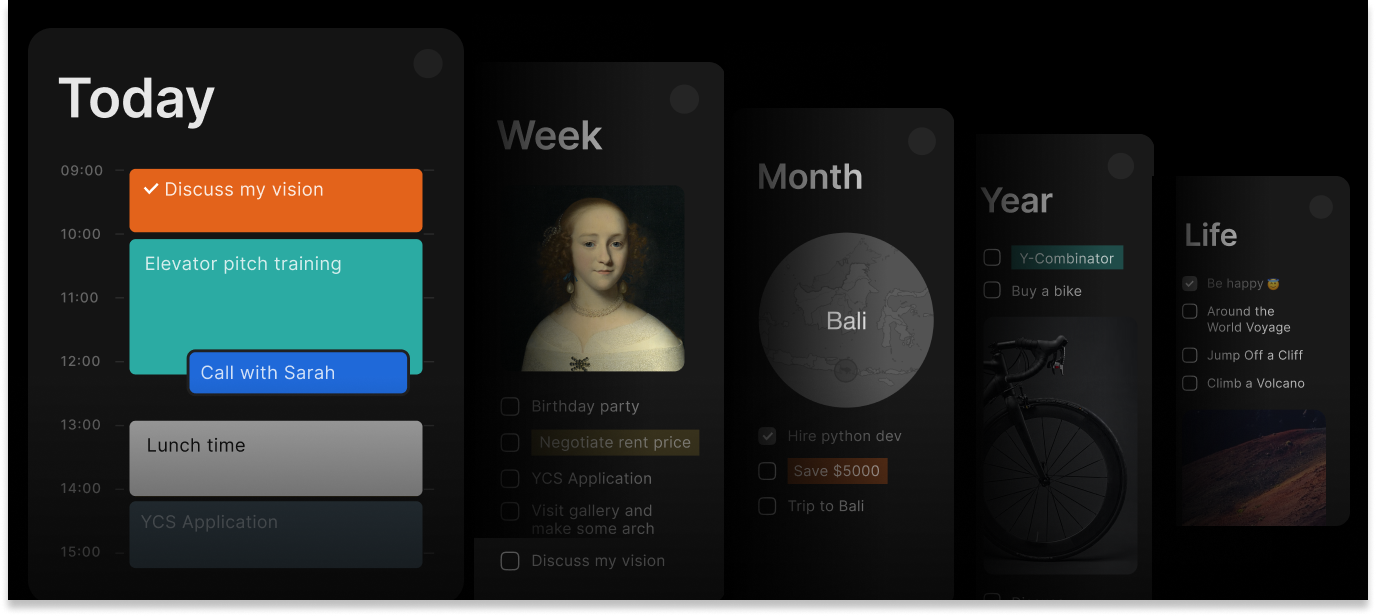- Connect your daily tasks with your long-term goals
- Keep knowledge and goals in one place
- Focus on consistency
- Have a plan to stay focused
- What Is Burnout? What Is Laziness?
- 6 Signs You’re Burnt Out
- Why the Confusion Persists
- How to Take Action
- Preventing Burnout, Embracing Rest
- The Power of a System
- Plan: Lay the Foundation
- Act: Make It Happen
- Refine: Keep It Sharp
- Personalization Prompt: Design Your System
- Why Should You Care About Deep Work?
- What Actually Counts as Deep Work?
- The Real Benefits
- Newport's Four Big Rules
- Key Takeaways and Next Steps
- Deep Work with Timestripe
- Common Ways People Mess This Up
- So, what’s next?
- Yaeji
- Oklou
- Aphex Twin
- Tycho
- Afrika Bambaataa
- Final Chord
- Why Breaks Matter
- Try these five strategies
- Own Your Workday
- The Birth of Digital Calendars
- The Rise of Web-Based Calendars
- How Timestripe Change the Way We Plan
- What Team Productivity Really Means
- Practical Ways to Boost Your Team's Performance
- Using Timestripe for Measuring and Tracking Productivity
- Why Rewarding Yourself for Achievements Actually Works
- The Benefits of Celebrating Success
- The Dark Side: When Self-Rewards Backfire
- How Companies Exploit Your Reward System
- How to Reward Yourself the Right Way: 7 Proven Strategies
- Healthy Ways to Celebrate Success Without Breaking the Bank
- Building Your Personal Reward System
- The Psychology of Sustainable Self-Celebration
- Finding Your Reward Rhythm in 2025
- What Are Smart Goals and Why They Actually Work?
- Breaking Down Smart Goals: It’s Simpler Than You Think
- S – Specific
- M – Measurable
- A – Achievable
- R – Relevant
- T – Time-bound
- Writing Your Smart Goals
- Pro Tips for Smart Goal Success
- Wrapping Up: Your Next Steps
- What’s Knowledge Sharing All About?
- Why Sharing Knowledge Pays Off
- The Kinds of Knowledge Worth Sharing
- How to Make Knowledge Sharing Happen
- Tackling Roadblocks to Knowledge Sharing
- Wrapping It Up: Try Timestripe for Smarter Sharing
- The Ultimate Goal
- Major Milestones
- Specifing Tasks
- The Logical Sequence
- Making a Schedule
- The Myth of Multitasking
- The Toll on Your Brain
- Why Single-Tasking Wins
- How to Break the Multitasking Habit
- The Path to Clarity
- Introduction
- What Is a Digital Mind Garden?
- Obsidian – Your Garden’s Foundation
- Timestripe – Your Garden’s Rhythm
- Are.na – Your Garden’s Muse
- Bringing It All Together
- Why Gen Z is Embracing Micro-Retirement
- Challenges of Micro-Retirement
- Benefits of Micro-Retirement
- The Science of Overthinking
- Pathways to Decisive Action
- The Decision Journal
- Timeless Takeaways
- Planning mistakes
- Lessons from Patrick
- Laptop Stand
- Pomodoro Timer
- Keyboard and Mouse
- Fidget Toy
- Desk Lamp
- Challenges of Remote Work
- Remote by Design
- Gitlab & Automattic Radical Transparency
- Effective Approach
- The Shift from Quiet Quitting
- Tips for a manager
- Why Employers Should Worry
- How Companies Can Stop the Bleeding
- Adapt or Watch Talent Go
- The Benefits of Reverse Mentoring
- How to Implement Reverse Mentoring
- What's the Conclusion
- Intro
- Why managers become seagulls
- Is it really that bad
- What to Do if a Seagull Has Built a Nest in the Office
- From teams' perspective
- Push for Clarity in Tasks
- Point Out Managerial Mistakes
- From upper management perspective
- What to do if the seagull is you
- How to prevent "seagulling"
- Writing a List
- Emile
- How Music Affects Our Brain
- What Types of Music Work Best
- Exploring Noise
- Why Some People Can't Work with Music
- Finding the Balance
- Why Gamified Summer Goals Work
- Try This Summer Guide
- Summer Challenge Prompt
- The absurdity of hierarchical structures
- Banality and everyday boredom
- Anti-burnout reminder
- Seagull Management
- Corporate irony
- Work as a place for social life
- Why The Office still resonates today
- Time-blocking
- Definition of Time Blocking
- Benefits of Time Blocking
- Meet Dan
- How Does Time Blocking Work
- Meet Sarah
- Using Timestripe for Time Blocking
- Recommendations for Effective Time Blocking
- Common Time Blocking Mistakes and How to Avoid Them
- Advanced Time Blocking Strategies
- My Five-Year Experiment with UTC
- Take Control of Your Time
- Why Bother With Weekly Planning?
- What Weekly Planning Actually Is
- Finding Your Sweet Spot
- How to Actually Plan Your Week
- Using Timestripe for Weekly Planning
- The Planning Mistakes That’ll Drive You Crazy
- Ready to Take Control of Your Week?
- The Metaphor Behind "Eating the Frog"
- The Core Concept and Its Origins
- Key Benefits
- Step-by-Step Implementation Guide
- Why Team Management Matters
- Different Ways to Manage a Team
- Must-Have Skills for Team Managers
- How to Get Better at Managing Teams
- Why Great Team Management Pays Off
- Five Practical Tips for Leading a Team
- Leveling Up with Timestripe
- Wrapping It Up
- Focused Thinking
- Diffuse Thinking
- Integrating Two Ways Thinking
- The Stress Trap
- Making Deadlines Your Ally
- A
- B
- C
- D
- E
- F
- G
- H
- I
- K
- L
- M
- N
- O
- P
- Q
- R
- S
- T
- Horizons
- Collapse Lists
- Goals sorting
- Subgoals
- Recurring goals
- Filters
- Dividers
- Colour coding
- Calendar
- Rich text formatting
- Tags
- Sharing Options
- Embeds
- Spaces
- Boards
- Templates
- Climbs
- The Progress Centre
- Team View
- Comments
- Quick schedule
- Keyboard Shortcuts
- Fullscreen view
- Recent items
- Quick Edit Shortcut
- Search
- Insights
- Backgrounds
- Dark mode
- Integrations
- Google Chrome Extension
- Mobile app
- Overview
- Clock
- Task Management & Organization
- Collaboration Features
- User Experience & Design
- Unique Features
- Pricing
- Final Thoughts
- Compare
- Collaboration Features
- User Experience & Design
- Best For
- Why it Matters
- Common Pitfalls
- How Boards & Climbs help
- Step-by-Step Implementation
- Key Analytics Features
- Activity Tracking
- Streak Monitoring
- Task Management Metrics
- Temporal Analysis
- Completion Rate Tracking
- Team Performance Optimization
- What is Obsidian
- What is Surfing plugin
- Use Timestripe in Obsidian
- Comments on tasks
- Task Assignments
- Efficiency Outcome
- User Experience and Design
Failures are our best teachers

Yesterday I woke up at 5 a.m. and couldn't sleep. Trying to fall asleep again, I caught myself ruminating the following words in my head: "Failures are our best teachers." Suddenly the whole story started to unfold in my mind, so I jumped up, took my laptop and started typing it until I lost my train of thought.
Half an hour later, I had a draft about the benefits that failures and mistakes bring us. Thus was born this post and Twitter thread.
Failure is the best teacher. Here are eight reasons why:
- Mistakes increase importance of wins.Failures teach us so much more than any success could ever teach. If it weren’t for our failures we wouldn’t value our wins and achievements, because there wouldn’t be anything to measure or compare them by.
- Continuous success blinds us with illusions.Successful projects and positive outcomes are necessary, but they don’t teach us much. Instead, they make us get along with the idea that if it worked this time it will always work in the future. But it won’t. That’s a cognitive bias we get trapped into.
Failures, on the other hand, teach us that if something didn’t work it didn’t work only here and now in this very conditions, in this context, on this project. It doesn’t mean it’s impossible or it won’t work some other time in some other place.
- Failures teach us patience.Having failed doesn’t mean we should stop trying. Failing at something teaches us to be patient and persistent about our approach. We learn to make projects and achieve results with a small steps strategy, not by making one perfect decision.
- Failing shows it’s OK to be wrong.It’s not the end of the world. Everyone makes mistakes. Even the great minds did. Why should we be perfect? There’s no need for that, no one expects that from us. We’re only expected to fulfill the commitments we’ve made. Nothing else.
- Mistakes encourage us to enhance our process.Failures help us discover the hidden power of limitations: time, money, and our physical capabilities. Any project has a limited amount of money and a deadline. Nor can we be productive six-eight hours in a row. Limitations help us find a solution within our available sources.

- Failures teach us to value the way, not the goals.Failures and limitations teach us to be flexible and not to put all our money and time on one great idea that will do all the work. Instead, we become more committed to consistency and methodicality rather than an occasional success. They matter more in the long run.
- Having failed doesn’t equal being bad at something.In the end, failures don’t define us as bad workers and contractors, or as being bad at our craft. They only mean that we chose the wrong way to solve the problem, and now we’re going to find another one until we find the right solution.
- To learn and improve you should be ready to fail.Writing this thread I recalled a good dialogue from “Game of thrones” that happened between Jon Snow and sir Davos Seaworth after Jon’s resurrection:
Jon: I did what I thought was right. And I got murdered for it. And now I’m back. Why?
Sir Davos: I don’t know. Maybe we’ll never know. What does it matter? You go on. You fight for as long as you can. You clean up as much of the shit as you can.
Jon: I don’t know how to do that. I thought I did, but… I failed.
Sir Davos: Good. Now go fail again.
If you’ve failed recently, don’t panic. Don’t stop dreaming, and don’t stop moving forward. Just go fail again.
Have a great week!
Evgeny, editor at Timestripe
Read next

